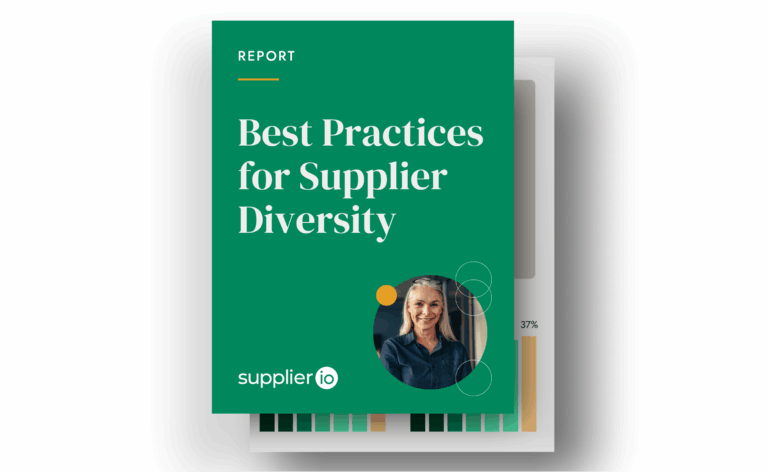Driving Financial Services Business Success Through Responsible Sourcing
Experts share valuable insights and best practices that other financial institutions can leverage to strengthen their responsible sourcing programs.

The financial services sector is increasingly recognizing the value of responsible sourcing, with a focus on supplier diversity, economic impact reporting, and competitive advantage.
In one of our recent webinars featuring industry leaders, panelists from KeyBank, Citizens Bank, and Intuit shared valuable insights and best practices that other financial institutions can leverage to strengthen their responsible sourcing programs. Below, we summarize key takeaways from the discussion.
The Business Case for Responsible Sourcing and Supplier Diversity
A core theme of the webinar was that responsible sourcing is not just about social responsibility—it is a business imperative. As organizations navigate economic uncertainty, regulatory shifts, and increased stakeholder expectations, supplier diversity emerges as a critical driver of resilience and growth.
Hugh Peltz of Citizens Bank noted, “We’ve seen business value for more than a decade from what has historically been called supplier diversity. When done right, it creates a competitive advantage and enhances resilience in our supply chain.”
Jason Cwiklinski of KeyBank reinforced this point, stating, “We’ve always had a long-standing commitment in this space. We see it as a business accelerator, and the data that comes with an economic impact report about jobs and wealth creation shows the tangible benefits.”
Beyond compliance and reputation management, the discussion highlighted how financial institutions can use supplier diversity and responsible sourcing solutions to strengthen market competitiveness, unlock innovation, and enhance their ability to manage supply chain risks.
Best Practices for Financial Institutions
The panelists shared several actionable strategies for improving responsible sourcing programs:
Leverage economic impact reporting
Accurate and up-to-date supplier data is crucial for making informed procurement decisions. Jennifer Johnston of Intuit emphasized, “When we use economic impact analysis, we can show our executives and stakeholders the direct benefits our supplier diversity efforts bring to the community. The data tells a compelling story.”
Economic impact reporting allows institutions to quantify the benefits of working with diverse suppliers, such as job creation and contributions to local economies. By using clear metrics, organizations can demonstrate the broader impact of their sourcing strategies to internal and external stakeholders.
Engage with business units
Supplier diversity teams should work closely with business units to ensure alignment with corporate objectives. Johnston added, “We are connectors within our business. We’re champions for these companies, and we are responsible for making sure that our companies select the very best.”
By integrating supplier diversity goals with corporate procurement strategies, institutions can increase supplier participation, drive stronger business outcomes, and ensure alignment with overall enterprise goals.
Enhance supplier payment terms
One challenge diverse suppliers face is delayed payments, which can hinder their ability to operate efficiently. Johnston shared a best practice from Intuit: “For small and diverse suppliers, we will pay as fast as our system allows us—under five days. This ensures they can reinvest in their business and grow.”
Improving payment terms for small and diverse suppliers can foster stronger relationships, improve supplier performance, and increase long-term sourcing success.
Navigating Policy and Compliance Changes
The evolving regulatory landscape requires financial institutions to stay agile. Peltz pointed out, “Based on executive orders and regulatory direction, we’re going to need to change some things. But what we do know is that historically, we’ve derived business value from this program, and we’ll continue to do that.”
Institutions must stay informed about policy changes while maintaining their commitment to responsible sourcing. By leveraging supplier intelligence platforms, they can ensure compliance while continuing to drive value through diverse and sustainable sourcing.
Looking Ahead
As financial institutions continue to refine their responsible sourcing strategies, the key takeaway from the webinar is clear: Supplier diversity drives business success. Organizations that integrate diverse suppliers into their procurement frameworks benefit from increased competition, innovation, and economic impact.
As Cwiklinski summed it up, “Economic impact analysis is more than just numbers; it’s about proving that supplier diversity strengthens businesses and communities alike.”
By embracing responsible sourcing, financial institutions can build stronger, more resilient supply chains while delivering measurable economic benefits to the communities they serve. The insights shared in this webinar reinforce the importance of data-driven decision-making, stakeholder engagement, and proactive supplier management in driving meaningful business impact.
Ready to prove the economic impact of your diverse sourcing program? Contact us today to meet with our experts.




